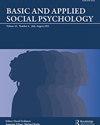存在的威胁推动了世界观防御,但在启动自主导向后却没有
IF 1.8
3区 心理学
Q2 PSYCHOLOGY, SOCIAL
引用次数: 10
摘要
虽然死亡显著性(MS)通常会激发世界观防御,但启动自主/自我决定取向可能会减弱这种防御。在研究1 (n = 156)中,除非参与者也被自主导向(相对于控制)概念启动,否则MS(相对于疼痛)对美国海外利益的军国主义防御有更高的支持。在研究2 (n = 205)中,一项试点调查发现,参与者强烈意识到并对宽容的文化价值感兴趣;除非参与者被提示回忆自主/自我决定(相对于受控)的经历,否则MS(相对于中性)对这一显著价值的捍卫程度更高,表现为支持更广泛/接受的移民政策。这些发现对攻击性和亲社会的存在主义防御、政治意识形态以及存在主义防御和成长取向的交叉具有启示意义。本文章由计算机程序翻译,如有差异,请以英文原文为准。
Existential Threat Fuels Worldview Defense, but not after Priming Autonomy Orientation
Abstract Although mortality salience (MS) typically motivates worldview defensiveness, priming an autonomy/self-determined orientation may attenuate that defensiveness. In Study 1 (n = 156) MS (vs. pain) had higher support for militaristic defense of American interests abroad, unless participants were also primed with autonomy-oriented (vs. controlled) concepts. In Study 2 (n = 205), a pilot survey found participants were strongly aware of and interested in the cultural value of tolerance; MS (vs. neutral) had higher defense of that salient value in the form of support for more expansive/accepting immigration policy, unless participants were primed to recall autonomous/self-determined (vs. controlled) experiences. These findings bear implications for both aggressive and prosocial existential defenses, political ideology, and the intersection of existential defense and growth orientations.
求助全文
通过发布文献求助,成功后即可免费获取论文全文。
去求助
来源期刊

Basic and Applied Social Psychology
PSYCHOLOGY, SOCIAL-
CiteScore
4.50
自引率
12.50%
发文量
7
期刊介绍:
Basic and Applied Social Psychology (BASP) emphasizes the publication of outstanding research articles, but also considers literature reviews, criticism, and methodological or theoretical statements spanning the entire range of social psychological issues. The journal will publish basic work in areas of social psychology that can be applied to societal problems, as well as direct application of social psychology to such problems. The journal provides a venue for a broad range of specialty areas, including research on legal and political issues, environmental influences on behavior, organizations, aging, medical and health-related outcomes, sexuality, education and learning, the effects of mass media, gender issues, and population problems.
 求助内容:
求助内容: 应助结果提醒方式:
应助结果提醒方式:


